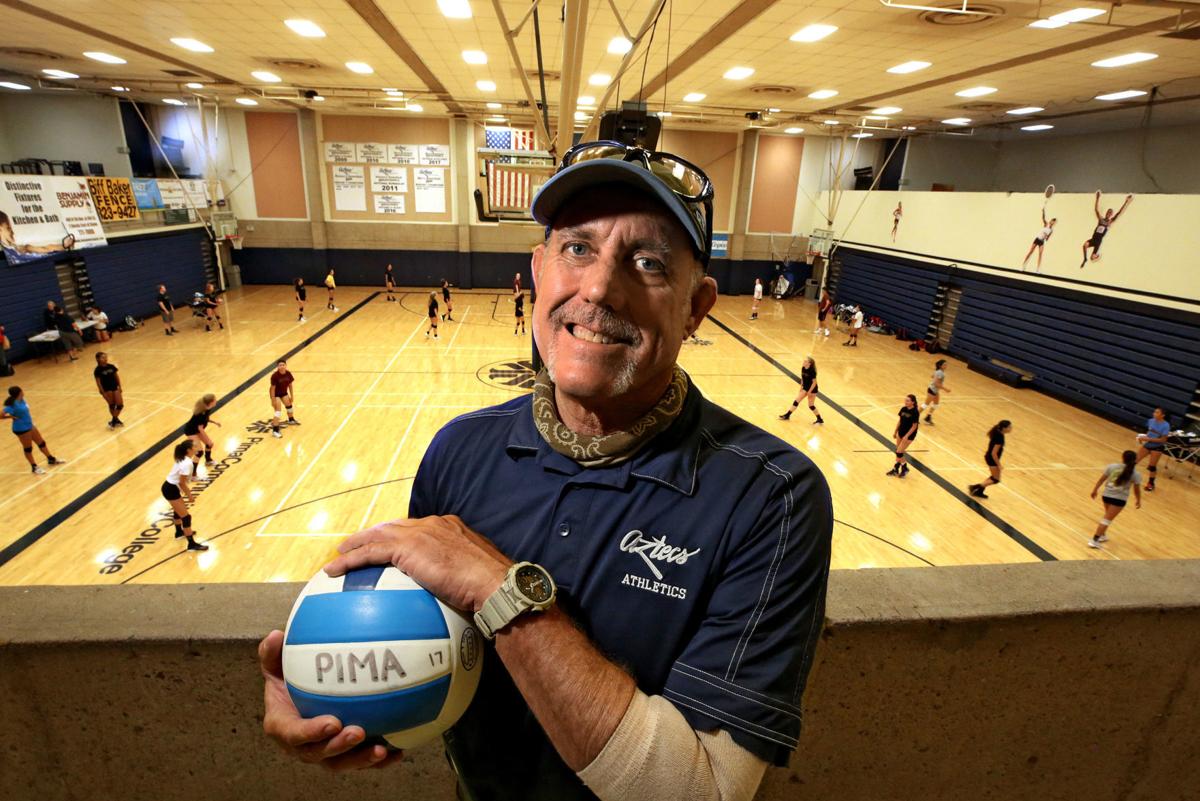Throughout the summer, Star columnist Greg Hansen is profiling 10 Tucsonans making a difference. Up today: Keith Martin, known as "Mr. Pima College."
On the morning of the Fourth of July, Keith Martin drove to his office at the Pima College athletic department and went to work. He wasn’t on anyone’s schedule. No events are planned until August.
Not a soul employed by PCC would’ve been surprised by this. It is what Keith Martin does.
“We’re getting our basketball court resurfaced from July 16 to August 3,” he says. “So I wanted to make sure there are no surprises. Oh, man, the result is going to be awesome.”
Martin’s enthusiasm is part of the fabric of the PCC athletic department.
“Keith is Mr. Pima College,” says Edgar Soto, the school’s athletic director and former baseball coach. “He’s very protective of our facilities and everything we do. He cares so much.”
On the Fourth of July, Keith Martin got all jacked up about resurfacing the Aztecs’ basketball court. If you find a man like that, don’t let him go.
Since he was hired as PCC’s athletics operations manager in 1998, Martin has worked for six athletic directors. The one constant is that Martin gets the job done, year after year. A few months ago, the school honored him for 20 years of dedicated service. Ever humble, Martin was caught off guard.
“Wow, do you have the right guy?” he asked.
He is surely The Right Guy.
If you ask Martin about a typical workweek, there is a rare silence. He loves to chat. But this question stops him.
“There’s no typical workday or workweek,” he says.
But here is what he did one February day last winter: He arrived early on campus to set up facilities for a track meet that began at 9:45 a.m. Then came the baseball program’s alumni game, followed by men’s and women’s basketball games.
He went home at 11 p.m.
“I drove home feeling like I’d done something worthwhile,” he remembers.
The thing about being the athletics operations manager at a place like Pima College is that nobody has the money to build a million-dollar batting facility or install a $5 million video board in the basketball arena.
“It’s a fiscal challenge unique to junior colleges,” says Martin. “Our 30-second shot clock for basketball isn’t in good shape. But we keep it functioning because we don’t have money to replace it. I’ve got lots of longevity out of our assets by being proactive.”
Martin remembers the days when future four-time Olympic distance runner Abdi Abdirahman, working on a student financial aid package, helped fold towels in the laundry room. But that financial aid plan no longer exists. It leaves the dirty work to Martin.
A few weeks ago, he transported 33 boxes of football gear to the campus, each weighing 65 to 80 pounds. He approached this with the seriousness of an auditor doing his income taxes.
“I’m responsible for the distribution and inventory of every piece of equipment in our department,” he says. “It’s a lot to look after, but my marching orders are to be on top of it, and I enjoy that component of my job.”
Not much is out of his reach.
When the Aztecs wanted to live-stream a football game at Kino Stadium, Martin figured it out. He ran a line of cable from the baseball press box to the sideline and got it to work. Soto sometimes shakes his head in wonder at what Martin gets done.
“He’s a lifelong learner,” says Soto. “He’s a black belt in karate. He’s a certified massage therapist. He plays the guitar. He was a Pac-12 volleyball official for about 20 years. He can grow grass, he can fix the gym floor, you name it.
“If you are ever stranded in the forest, Keith Martin is the guy you’d want with you. He’d figure out a way for you to survive.”
Martin didn’t wander aimlessly into this career in Pima’s athletic department. He was a teenage athlete of note, an all-star on the famous Cactus Little League baseball teams of the 1970s that included future St. Louis Cardinals catcher Tom Pagnozzi and New York Mets outfielder Mark Carreon.
He became fascinated with the Tucson Sky professional volleyball teams of the ’70s — “blown away,” he says — and enrolled in advanced volleyball classes at PCC when he was still at Rincon High School.
By 1992 he was PCC’s head volleyball coach. He soon became one of the Pac-10’s leading volleyball officials, spending 18 years refereeing games at every Pac-10 school. He was so good that he was hired to work Team USA international volleyball games against Cuba and Poland.
But when Pima offered him a chance to be chief of athletics operations, he left coaching.
Well, sort of.
He has helped his wife, Heather Moore-Martin, coach four state championship volleyball teams, two each at Catalina and Salpointe Catholic high schools, and most recently helped Heather launch beach volleyball as a sanctioned high school sport in Arizona.
“I’m the lucky one here,” he says. “I get to be around all these wonderful people every day. And the one thing I’ve learned is that it’s not about wins and losses. A few years ago, one of the former women’s volleyball players invited me to her wedding.
“I can’t remember how her teams did at Pima; maybe they went 0-18. But when she invited me to her wedding, it was like they went 18-0. Little things like that are what makes this job so rewarding.”





